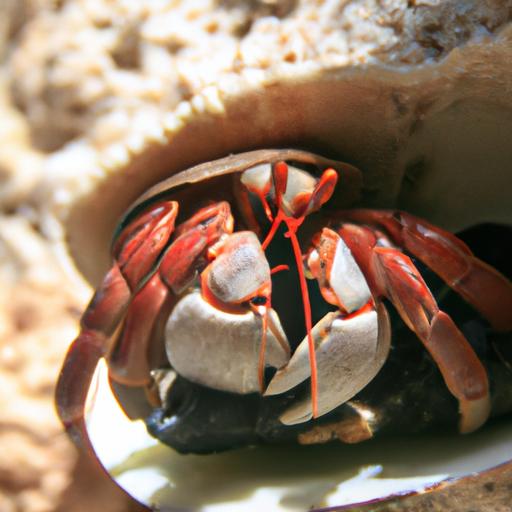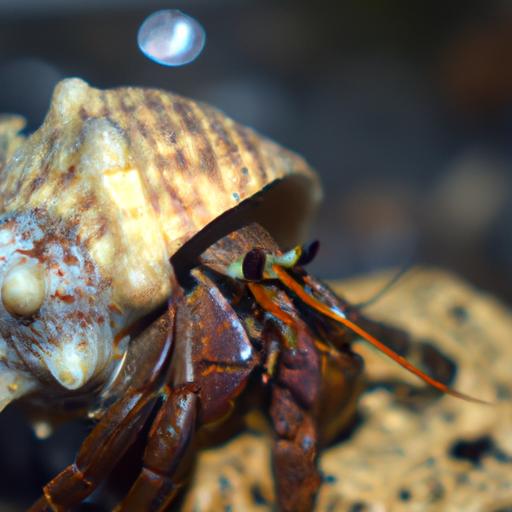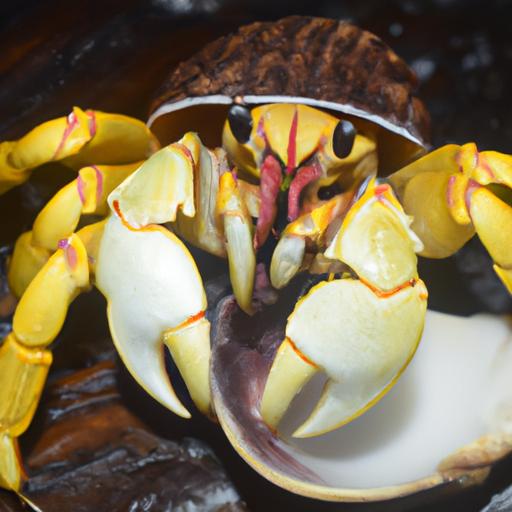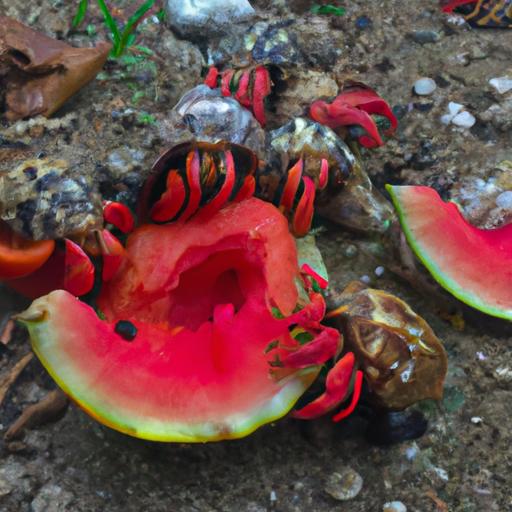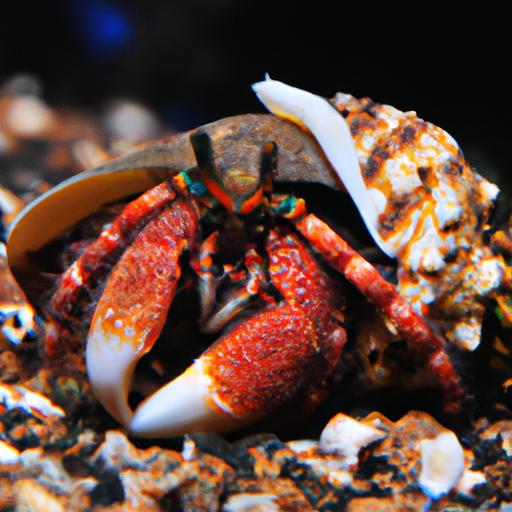Can Hermit Crabs Eat Watermelon?
Introduction
Are you a proud hermit crab owner, always on the lookout for new and exciting foods to add to your crab’s diet? If so, you might be wondering if watermelon is a suitable treat for your adorable crustacean companion. In this article, we will explore the intriguing question: can hermit crabs eat watermelon? But before we dive into the answer, let’s start with a brief overview of hermit crabs as pets and the significance of providing them with a balanced diet.
A. Overview of Hermit Crabs as Pets
Hermit crabs, with their unique ability to change shells and their amusing behaviors, have become popular pets among animal enthusiasts. These small creatures are not only captivating to observe but also relatively low-maintenance compared to other pets. However, it is crucial to keep in mind that hermit crabs require proper care and nutrition to thrive in captivity.
B. Importance of Providing a Balanced Diet for Hermit Crabs
Just like any other living being, a balanced diet is essential for the overall well-being of hermit crabs. Providing them with a variety of foods that mimic their natural diet ensures they receive the necessary nutrients to stay healthy. A diverse diet helps prevent nutrient deficiencies and promotes their growth and vitality.
Now that we understand the basics, let’s delve into the main question: can hermit crabs munch on watermelon? Join me in the next section as we explore the dietary preferences of hermit crabs and uncover the truth about watermelon as a potential addition to their menu.
Can Hermit Crabs Eat Watermelon?
Understanding the Dietary Preferences of Hermit Crabs
Before we determine whether watermelon is suitable for hermit crabs, let’s take a closer look at their natural dietary preferences. In the wild, hermit crabs are omnivorous, meaning they consume both plant matter and small marine organisms. Their diet primarily consists of fruits, vegetables, leaves, flowers, and occasionally, meat from decaying organisms. As scavengers, hermit crabs have a wide-ranging palate and adapt to the available food sources in their environment.
Exploring the Nutritional Composition of Watermelon
Now that we understand the general dietary preferences of hermit crabs, let’s examine the nutritional composition of watermelon. Watermelon is a delicious and refreshing fruit cherished by many, but is it suitable for our shelled companions? Watermelon is primarily composed of water, making it a hydrating snack for both humans and animals. However, it also contains essential vitamins and minerals such as vitamin C, vitamin A, potassium, and lycopene. These nutrients play vital roles in overall health and can contribute to the well-being of hermit crabs.
Potential Benefits of Feeding Watermelon to Hermit Crabs
Feeding watermelon to your hermit crab can offer several potential benefits. The high water content helps keep your crab hydrated, which is essential for maintaining their overall health and preventing dehydration. Additionally, the vitamins and minerals present in watermelon can provide a nutritional boost to your crab’s diet. Vitamin C, for example, supports their immune system, while vitamin A promotes healthy growth and development. The potassium in watermelon aids in proper muscle and nerve function.
In the next section, we will delve deeper into the specific nutritional value of watermelon for hermit crabs. Join me as we explore the vitamins, minerals, and hydration benefits that this juicy fruit can offer to our little crustacean friends.
Nutritional Value of Watermelon for Hermit Crabs
Analysis of Watermelon’s Vitamins and Minerals
Watermelon, with its vibrant red flesh and refreshing taste, is not only a delightful summer treat for humans but also potentially beneficial for hermit crabs. Let’s take a closer look at the vitamins and minerals present in this juicy fruit that may contribute to the overall health of our crustacean pals.
Watermelon is known for being rich in vitamins A and C. Vitamin A plays a crucial role in maintaining the integrity of a hermit crab’s exoskeleton, while vitamin C is essential for their immune system. Additionally, watermelon contains small amounts of vitamins B6 and B5, which are vital for energy metabolism and the proper functioning of various bodily systems.
In terms of minerals, watermelon provides a decent amount of potassium, which aids in maintaining proper muscle function and electrolyte balance. It also contains magnesium, an important mineral for nerve function and protein synthesis. While these nutrients are beneficial, it’s important to note that hermit crabs require a well-rounded diet that includes other food sources to meet their nutritional needs fully.
Watermelon as a Source of Hydration for Hermit Crabs
As we know, hermit crabs originate from tropical regions and have a natural affinity for humid environments. Staying hydrated is crucial for their survival and overall well-being. While hermit crabs primarily obtain moisture from their surroundings, providing them with additional sources of hydration is essential, especially in drier conditions.
Watermelon, composed of approximately 92% water, can serve as a hydrating snack for our crustacean friends. Feeding them small, appropriately-sized pieces of watermelon not only provides a refreshing treat but also contributes to their overall hydration levels. However, it’s important to remember that watermelon should not replace their primary water source, such as a shallow dish of fresh, chlorine-free water.
In the next section, we will explore how to effectively incorporate watermelon into a hermit crab’s diet, including serving size and frequency, as well as potential precautions to consider. Stay tuned to learn more about feeding watermelon to your beloved hermit crab companions.
Feeding Watermelon to Hermit Crabs
A. Guidelines for Incorporating Watermelon into a Hermit Crab’s Diet
Now that we know hermit crabs can enjoy watermelon as a treat, it’s important to understand how to incorporate it into their diet effectively. Here are some guidelines to follow:
-
Moderation is key: While watermelon can be a delightful addition to a hermit crab’s menu, it should be offered in moderation. Too much watermelon can cause digestive issues, so it’s best to provide it as an occasional treat rather than a staple food.
-
Fresh is best: Always serve fresh, ripe watermelon to your hermit crab. Avoid offering overripe or rotting slices, as they can be harmful to their health.
-
Remove the rind and seeds: Before serving watermelon to your hermit crab, ensure you remove the tough outer rind and any seeds. These parts can be challenging for them to digest and may pose a choking hazard.
B. Recommended Serving Size and Frequency of Watermelon
When it comes to serving size and frequency, it’s important to strike a balance. Too little watermelon may not provide the desired benefits, whereas excessive amounts can lead to health issues. Here are some recommendations to keep in mind:
-
Serving size: A small cube or slice of watermelon, approximately the size of your hermit crab’s claw, is an appropriate serving size. This allows them to enjoy the flavors without overwhelming their digestive system.
-
Frequency: Offer watermelon to your hermit crab once or twice a month. This ensures they receive the nutritional benefits without disrupting their overall diet.
C. Precautions and Potential Risks of Feeding Watermelon to Hermit Crabs
While watermelon is generally safe for hermit crabs, it’s crucial to be aware of potential risks and take necessary precautions:
-
Sugar content: Watermelon contains natural sugars, and excessive consumption can lead to obesity and other health issues in hermit crabs. Ensure you balance their diet with other nutritious foods to maintain their overall well-being.
-
Monitor for allergies or digestive issues: Introduce watermelon gradually into your hermit crab’s diet and observe their response. If you notice any allergic reactions or digestive problems, discontinue feeding watermelon and consult a veterinarian if necessary.
By following these guidelines and being mindful of potential risks, you can safely incorporate watermelon into your hermit crab’s diet and provide them with a delightful and refreshing treat. In the next section, we will explore alternative fruits that can further diversify their menu and promote a well-rounded diet.
Alternatives to Watermelon for Hermit Crabs
Other Fruits Suitable for Hermit Crabs’ Diet
While watermelon can be a refreshing and nutritious treat for your hermit crab, it is always good to provide them with a diverse range of fruits to keep their diet balanced and interesting. Here are some other fruits that are suitable for hermit crabs:
-
Bananas: Rich in potassium and easily digestible, bananas are a great choice for your crab. Mash a small piece and offer it as a tasty snack.
-
Berries: Strawberries, blueberries, and raspberries are packed with antioxidants and essential vitamins. Ensure you wash them thoroughly and cut them into small, manageable pieces.
-
Apples: Apples are a crunchy and nutritious option. Remove the seeds and core, then slice the apple into small chunks for your crab to enjoy.
Remember, moderation is key when offering fruits to your hermit crab. Too much fruit can lead to an imbalance in their diet, so it’s essential to provide a variety of food sources.
Balancing the Diet with Protein-Rich Foods
While fruits are a delightful addition to your hermit crab’s diet, it’s important not to overlook the significance of protein-rich foods. Protein plays a vital role in their growth and overall health. Here are some protein sources you can include in their diet:
-
Fish or Shrimp: Offer small pieces of cooked fish or shrimp as a protein boost. Make sure to remove any bones or shells before serving.
-
Mealworms: Dried mealworms or small pieces of live mealworms can be a tasty and protein-packed snack for your crab. These can be found at pet stores or online.
-
Eggs: Hard-boiled eggs, mashed or cut into tiny pieces, can be a nutritious protein source. Remember to remove the shell and offer small portions.
Finding the right balance between fruits and protein-rich foods will help ensure your hermit crab receives a well-rounded diet. Remember to introduce new foods gradually to avoid digestive issues and monitor your crab’s response to different offerings.
In the following section, we will conclude our exploration of the watermelon dilemma and summarize the benefits and considerations of feeding watermelon to hermit crabs.
Conclusion
In conclusion, if you’ve been wondering whether hermit crabs can enjoy the sweet juiciness of watermelon, the answer is a resounding yes! Watermelon can be a delightful addition to their diet, offering hydration, vitamins, and minerals. However, it’s important to remember that moderation is key. While hermit crabs can enjoy the occasional watermelon treat, it should never replace their staple diet of protein-rich foods and other fruits.
To ensure the health and happiness of your hermit crab, maintain a balanced diet that includes a variety of foods. Remember to provide fresh water and monitor their consumption to prevent overindulgence. As a responsible hermit crab owner, it’s crucial to stay informed about their dietary needs and make informed decisions regarding their nutrition.
So, the next time you’re enjoying a juicy watermelon slice on a sunny day, you can share a small portion with your beloved hermit crab, knowing that you’re providing them with a tasty and nutritious treat. Just imagine the joy they’ll experience as they nibble on the vibrant red flesh! Remember, a happy hermit crab is a healthy hermit crab.
I hope this article has shed light on the possibility of including watermelon in your hermit crab’s diet. By considering their dietary preferences and nutritional requirements, you can create a menu that keeps them content and thriving. So go ahead, offer your hermit crab a taste of watermelon paradise and watch their little claws dance with delight!
Happy hermit crab keeping!
